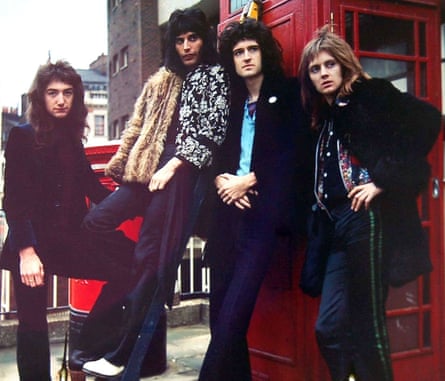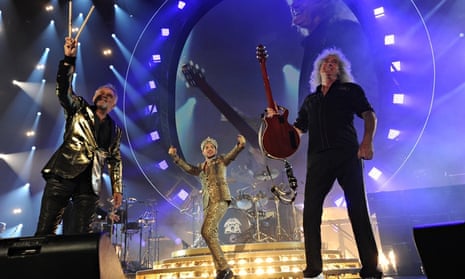Freddie Mercury once said he became a rock star because he had no other skills: “I can’t cook, I’m not much good at being a housewife.” Queen have a way of talking about their work which is at odds with the grand gestures they are famous for. Next week, they will lead the country’s new year celebrations with a show from Westminster, broadcast live to an audience of millions on the BBC. Roger Taylor, the world’s most softly spoken drummer, tells me that he is pleased to be working at new year because it can be a bit of an anti-climax.
In the past two years, Queen have refined a futuristic model for rock bands in which a former TV talent-show contestant (Adam Lambert, runner-up on American Idol in 2009) hovers in the space Lord Freddie left behind. Lambert says that he has had some “polarising experiences” in the role of frontman – “I’m either a love it or hate it kind of guy” – but the ticket sales speak for themselves: in January and February, they will play to 160,000 in arenas across Britain. Freddie liked to toast his audience with champagne but even he didn’t get to do a new year show on the BBC.
“All I know is, we’re going to be right next to Big Ben,” Lambert enthuses in his London management offices. “Maybe we can scale him [Ben]. Maybe Brian can climb him! Maybe we can re-enact that thing from Peter Pan where they ride around on the clock hands …”
He is dressed in black, wearing a fedora and boots of finest snake. He has a new tattoo replicating the baroque “Q” Mercury designed for Queen’s first album in 1973. His style is more “rock” than it was when I last saw him on stage with them in 2012, wearing a red feathery jacket.
“See, rock to me is, like, I don’t even know what that means,” he cries. “What does that mean? Does it mean there’s a guitar in it?!”
It is easy to see how Lambert has “rejuvenated” the remaining members of Queen (Roger Taylor’s words). I meet Taylor at his home studio in Surrey: he describes the interior of the new year gig venue – Westminster Methodist Central Hall – as “rather Wesleyan – no frills!” Taylor left religion behind years ago, worn out by his time as a choir boy at Truro cathedral, where he had to sing three services on Christmas Day. His house being a former priory, he has a church in his garden but he assures me: “When I moved in, God moved out.”
As for the third member of the present day Queen, here is Dr Brian May at the Science Museum in London, leading a live satellite link with fellow scientists to mark the launch of World Asteroid Day (30 June 2015). The team are currently working to develop something called a gravity tractor, a theoretical spacecraft designed to deflect dangerous matter away from the earth’s surface. “It’s not too far from Bruce Willis, really,” May tells me. “There is stuff out there which can make a terrible mess if it hits us, to put it mildly!”
We are within spitting distance of Imperial College, where, in 1968, May, a physics student, pinned up a note asking for a “Ginger Baker/Mitch Mitchell-type drummer” and attracted the interest of a young blond studying dentistry. Within a few months, May and Taylor had another musician sniffing around – a shy, breathlessly enthusiastic young man in vintage clothing who had moved from Zanzibar seven years earlier, and by whom they took a little while to be convinced on a professional level.
“Freddie is like a myth,” Lambert says. “It’s like he’s not real. When I look at footage of him, the voice, the command of the stage – it is extremely intimidating to walk up to.”
Lambert’s TV talent-show training – a Michael Jackson cover one week, AC/DC the next – prepared him for life in a band whose output ran from metal to vaudeville. “There is no period of Queen that we can’t attempt with him,” May says. The new show has a historical narrative of sorts, including bits where Lambert disappears completely to “blot off and have a drink”, leaving the others to commune with a screen version of Freddie. There’s a retro aesthetic including, for the geeks, a recreation of Queen’s face-melting “pizza oven” lighting rig from the 70s. (“We are rather fond of tungsten,” May says – “it’s like being baked alive.”) The whole thing seems appropriate in an era when rock music is earning more money on the West End stage than it is on Spotify. But for the record, despite rumours, there will be no more Queen musicals (“a terrible idea,” Taylor says).
May says it takes an audience three songs to “get” Lambert. “I can see it: they’re thinking: ‘Is he up to this?’ The other day on The X Factor, we had no idea he was going to go for that last high note [on Somebody to Love]. I was hitting this big chord and thinking: ‘My God! Isn’t that a little dangerous? Jesus Christ he’s made it! What a great decision!’”
This scenario will be touchingly familiar to anyone who grew up watching Mercury’s high-wire vocal acts in the stadia of the 1980s, steam rising from his nostrils, mascara running down his cheeks.
Above all, in comparison with the meat-and-two-veg Paul Rodgers incarnation of Queen a few years back, the Lambert show is in many places “absurdly camp”, which, it becomes more and more obvious talking to the band, is their most comfortable setting, on a very deep level. “If Adam does something camp, it’s because it’s Adam,” May says. “He’s not trying to be Freddie. Freddie is mentally and physically present throughout the show and everyone knows that.” Lambert has staged a new version of Killer Queen, Mercury’s story of a high-class callgirl: “All I can say is, I asked for a fan, ridiculous footwear and something to lounge on.”
Does he make all the band’s clothing decisions now?
“No. Brian’s Adidas are really cool. He’s always worn the same ones and now they’re back in fashion again.”

Lambert was nine when Mercury died of Aids in 1991. He is gradually deepening his understanding of a figure who remains one of the most mysterious in the great rock’n’roll story, partly because Mercury didn’t really like interviews and partly because journalists didn’t really like Queen.
“I think it’s interesting that he was so masculine in the 80s,” Lambert says. “Some people might have said he was trying to compensate – I think he was evolving.” Little by little, Freddie’s psychology is emerging. “Brian told me he’s always suspected that the song In the Lap of the Gods was Freddie’s way of expressing his frustration about not being able to be openly gay,” he says. “‘It’s so easy but I can’t do it/So risky but I’ve got to chance it/So funny but there’s nothing to laugh about …’ I’m well past it now – I think we are living in a post-gay age where, fuck it, no one cares – but I had my own version of that struggle when I started out five years ago – navigating the media is very tricky. I can only imagine what it must have been like back then.”
According to Brian May, it was actually easier back then. “You have to remember that Adam was stopped from winning American Idol by a huge anti-gay lobby,” he says, referring to the time the panel on Fox News’s The O’Reilly Factor took time to discuss pictures of Lambert kissing another man just before the final. Two years later, when he kissed his bassist on stage during one TV show, the ABC channel got so many complaints, it cancelled his Good Morning America performance.
“For most of our career, we were not actually tabloid fodder at all,” May says. “We were allowed to be public when we were performing and to be private when we weren’t. When a Melody Maker journalist asked Freddie if he was gay, he said, ‘As a daffodil,’ and the next paragraph moved on.”
The press onslaught really only came when Mercury got ill, a period marked sardonically in Taylor’s studio by the presence of a toy “Paparazzi Playset” from the makers of “Dashboard Jesus”, which includes nine miniature snappers and a tiny velvet rope. Taylor never forgave the red tops, but he does agree with Lambert that the attitude towards gay pop stars is radically altered. “I always felt that there was an unspoken, invisible opposition to the camp side of our personality back then,” he says. “Adam is completely unambiguous about his sexuality and that is a huge freedom for all of us. Plus, he’s hilarious so you can’t take offence, and anyone who takes offence shouldn’t be there anyway.”
Queen always kept themselves to themselves. There were apparently huge rows back in the day but no one outside their inner circle knows what they were about. John Deacon, who has not been involved in the group since 1997, once ran away to Bali in the middle of a recording session leaving a note on his bass (“I’ve gone to Bali”). According to Lambert, May and Taylor “love each other and bicker like an old married couple. It is totally passive aggressive and great.” Meanwhile, for a band who once hosted a party at which, as one music magazine put it, “guests are greeted by a troupe of hermaphrodite dwarves serving cocaine from trays strapped to their heads; the coke has been specially imported from Bolivia and quality-checked by Mercury,” they don’t tell tales of aftershow debauchery. Are things more sedate now?
“Sadly!” Taylor replies. “The upside is that everything is so much more efficient. There wasn’t a single night on this last tour where the show started one minute late. It’s all so professional these days. Even the roadies have lawyers.” He feels it best to clarify. “They don’t really.”
How about the physical strain at their age?
“Well, I still get surprised when I think to myself: ‘You really are quite old now.’ We are very lucky to have our faculties. The load is heavier but I have my son with me [he has put his son, Rufus, to work – they perform drum duets]. So, you know, as my old hands start to crumble, his young flexible limbs take the weight.”
May admits downtime on tour is now a matter of conserving energy, rather than sightseeing or partying. Still, while setting up my interview, I get a text from him at 2am. I ask Taylor if he thinks May is nocturnal. “Yes, I get emails where it says 5.32am,” he says. “Brian did a lecture on French stereo photographs the other day and he delivered the whole thing in French. He told me: ‘I did a bit of homework.’ I thought: ‘Bloody hell, rather you than me, mate.’”
Lambert has lightened them up, May says: “He brings a lot of fun to the situation, the way Freddie did. In the old days, we were worried about everything being perfect. And now we have a real awareness that there aren’t many people out there playing completely live, so you treasure the mistakes you make.”
May has bigger things on his mind than technical perfection, anyway. I ask him for Queen’s Christmas message and he says: “We need a change of government, and if there isn’t one, I think we will all slit our wrists.”
More important than that, what about the future of rock’n’roll?
“Those things are for ever,” he says, “as long as the asteroid doesn’t strike and wipe us all out.”

Comments (…)
Sign in or create your Guardian account to join the discussion